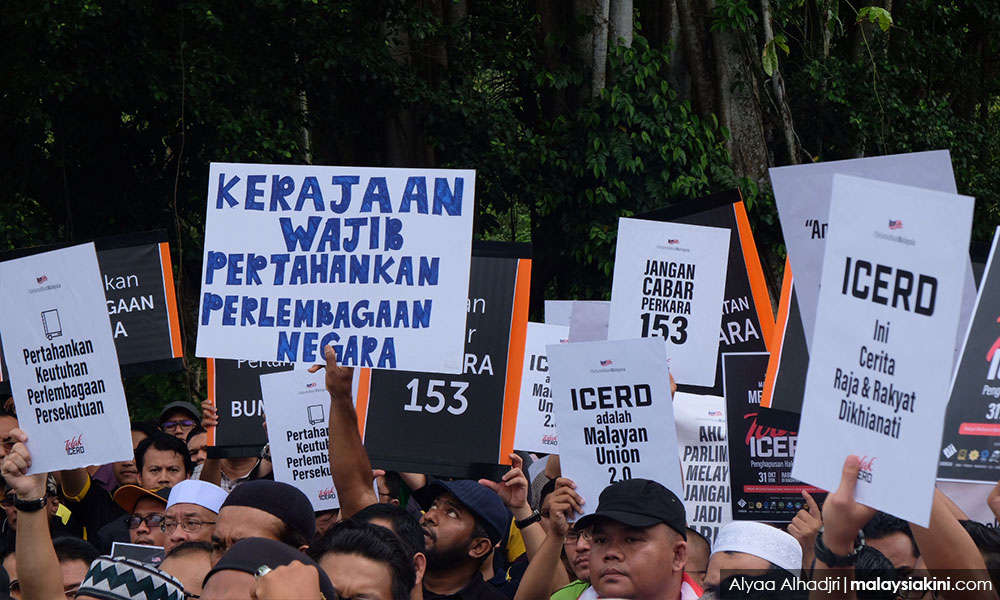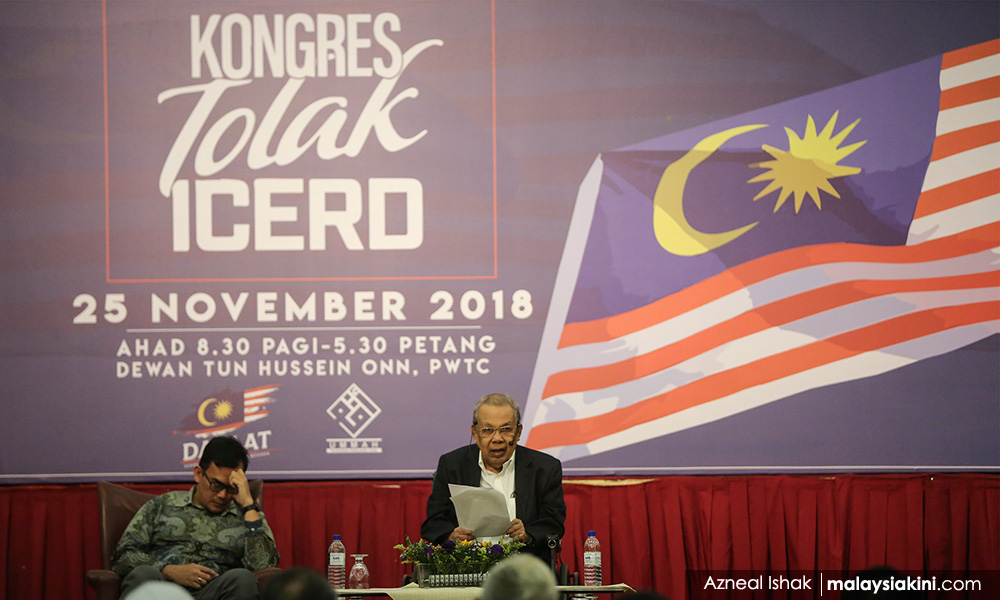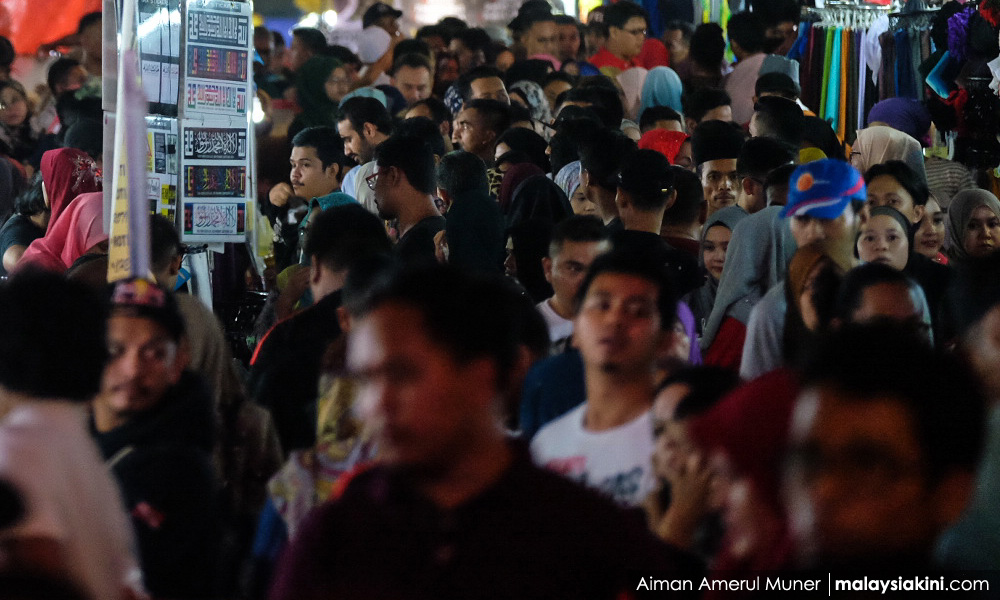
For a moment, Malaysians came together in grief over the MH370 and MH17 tragedies. Four years on, the proposed ratification of the International Convention on the Elimination of All Forms of Racial Discrimination (Icerd) has again rattled the racist agitators.
The media can do better to bring back rational talk on an issue that demagogues have exploited to pander to their base.
Journalists are in principle colour blind. They know no class or creed distinction. But the doctrine of impartiality in reporting has its logical limits. There are exceptions when the minions of Umno and PAS raise false flags on UN conventions that are designed to “guarantee the right of everyone, without distinction as to race, colour, or national or ethnic origin, to equality before the law.”
While the media routinely cover the alarmist protests of anti-Icerd reactionaries, journalists owe it to their readers to provide a context as to why the convention was first written and finally adopted by the UN General Assembly in December of 1965.
Absent in various reports is contextualising of the issue, especially in Bahasa Malaysia, where imagined fears from ratifying Icerd are rife among the Malay population.
Malaysiakini and other news portals have rightly published commentaries and background reports on Icerd. But these are few in between – particularly articles in Bahasa Malaysia to inform and educate the Malay readership.
Journalists should spike any wanton disinformation and fact-check the reactionaries’ claim that ratifying the Icerd will undermine “the special position of the Malays and bumiputera” when in fact it does not violate Article 153 of the Federal Constitution, according to the Malaysian Bar and the Icerd working group, nor does it undermine the country's sovereignty.
It only takes a few phone calls to sources in Pusat Komas, Sisters in Islam, Suaram or Bebas for informed reactions to the former chief justice Abdul Hamid Mohamad’s racialist spin on the Icerd. This is the three-source rule in reporting.
Media coverage ought to exercise greater discretion in reproducing the identity politics that ultra-conservatives pander to with impunity. Racial politics should be reframed, interpreted and written in terms of the real costs and benefits to the country’s development of its human capital and economic growth.
Communal separation
While a sense of identity can be a source of confidence and strength, it can also be a source of communal separation and personal abasement. This was apparent in a shopper’s encounter with a female beer promoter at Giant hypermarket.
Mohamad Edi Mohamad Rias, or 'Edi Rejang', publicly apologised for his impulsive racial spat. He lost his job as a dispatcher, his family were harassed on social media, and the promoter became an overnight social media hit for her calm response.
The incident was depicted as a viral video phenomenon. The stories stopped short of following up in-depth the broader issue of why a shared Malaysian identity still eludes us 60 years after our independence.
Edi's expectation that all Malaysian should speak Bahasa Malaysia in the public space because this is “bumi Melayu (Malay land)" may or may not represent the dominant mindset. It does, however, underscore the different paths that the Malays, Chinese and Indians have been treading on for the last six decades.
How often do we hear bandied on the political circuit this threat: “Let no one from other race ever question the rights of Malays on this land.” And its counter: “We have every right to be here. We, the Chinese and Indians, have helped develop the country to what it is today.”
The denial of each other’s history and disparate racial realities in the formation of Malaysia will keep at bay the framework of interracial trust that we need badly in order to move forward.
We are products of our time and place. Born into a family we grow into a neighbourhood of friends, kith and kin. We move into towns and cities. Some of us remain where we are and do what our parents and grandparents did.
A different worldview
We acquire our beliefs and values from family and friends, from formal education and incidental learning along the way. Therein our mindset develops and forms our sense of identity. This could explain the alarmist anti-Icerd protests and the 'bumi Melayu' worldview.
I do accept the moral justification for affirmative action to address socioeconomic disparities, structural racism and marginalisation of minority groups, such as the black Americans and native Indians in the US, the Dalits in India, the Roma people in Eastern Europe, the Aboriginal people in Australia.
In our case, however, Malays account for nearly 70 percent of the population, and probably increasing. Continuing the racial discriminatory policies in this context can no longer be justified. This is the hidden thorn on the side of non-bumiputera citizens today.
The racial mindset is apparent in the Pakatan Harapan leadership. And, it is as entrenched in the BN opposition. The disconnect between Harapan's election reform manifesto – expressed in its Pillar 5 promises (49, 50, 53, 54) to create an “inclusive and moderate” Malaysia – and its leaders’ public statements is becoming more apparent.
This is evident in the self-contradicting message of PKR president Anwar Ibrahim, who overtly rejects discrimination and racial ideologies on the international stage, but at the same time professes to his base his “love for the Malay race and culture”, and his “confidence in the principles of Islam” if he ever becomes the next prime minister.
We know for a fact that prejudices are learned from childhood. There is no other institution as conducive than in the home and school environments to inculcate interracial literacy and inclusive mindsets in the young generation.
Given the right environment and governed by, we hope, a transformative Harapan leadership, the young generation could be drawn to the merits and good in each other than be separated by race, religion and special rights.
Politicians certainly find it hard to expunge racial and religious referents from their speeches to sustain support from their base.
But journalists, as the voice of the people, and social media users can do better in speaking truth to power.
The remedial steps are basic – consistently fact-check and truthfully expose in different languages the hypocrisies and disinformation by manipulative sources.
ERIC LOO is a senior fellow (journalism) at the School of the Arts, English & Media, Faculty of Law Humanities & Arts, University of Wollongong. He is also the founding editor of Asia Pacific Media Educator. - Mkini






No comments:
Post a Comment
Note: Only a member of this blog may post a comment.